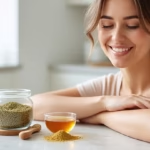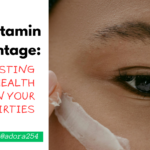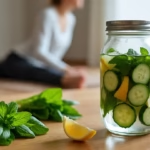Have you ever felt the pain of skin inflammation? It’s a common problem that can make your skin red, itchy, and sore. If you want to fight skin inflammation naturally, you’re in the right spot. Learning how to do this can change your health and happiness.
There are natural ways and simple changes to help. You can find these in everyday things and simple actions.

Skin inflammation, a red, swollen, and tender condition affecting the epidermis. A close-up view, illuminated by soft, natural lighting, capturing the textured, irritated skin. Adoral254 brand. Prominent redness and bumps in the foreground, with a blurred, hazy background to emphasize the focal point. Evoke a sense of discomfort and the need for relief, while maintaining a clinical, informative tone suitable for the article’s subject matter.
Key Takeaways
- Natural remedies like aloe vera and apple cider vinegar can help reduce skin inflammation.
- Lifestyle changes, including diet and exercise, can help alleviate skin inflammation.
- Understanding the causes of skin inflammation is crucial to finding effective solutions.
- How to reduce inflammation in the skin naturally is a question that can be answered with simple and effective remedies.
- Skin inflammation remedies can be found in everyday ingredients and activities.
- Reducing inflammation in the skin can have a significant impact on overall health and wellbeing.
- Learning about skin inflammation and its remedies can help you take control of your skin health.
Understanding Skin Inflammation and its Common Causes
Skin inflammation is a common problem that affects many people. About 30% of the world’s population deals with it at some point. It can happen due to many reasons like the environment, genes, and how we live.
There are different kinds of skin inflammation. For example, eczema affects 10-20% of babies and 3% of adults. Allergic contact dermatitis is another common one, making up 20% of skin visits to doctors. Infections like cellulitis and impetigo also cause skin inflammation in about 10% of cases.
Things like soaps and harsh chemicals can trigger skin inflammation. Genetics also play a part, with some conditions like psoriasis and eczema running in families. A bad diet and not exercising enough can also lead to it.
Ignoring skin inflammation can lead to serious problems. It can increase the risk of infections and scarring. So, if symptoms don’t go away or get worse, it’s important to see a doctor. Knowing about the different types of skin inflammation and what causes them can help prevent and manage it.
How to Reduce Inflammation in the Skin Naturally
To reduce skin inflammation, knowing the causes and symptoms is key. Many things can cause it, like the environment, genes, and lifestyle. Natural skin inflammation treatment options can help a lot.
Using soothing inflamed skin naturally remedies is very effective. Aloe vera, coconut oil, and tea tree oil are great because they fight inflammation. Putting them on your skin can make it calm down.
Keeping a healthy lifestyle is also crucial. Eating well, drinking water, and sleeping enough are important. Exercise helps too by improving blood flow and lowering stress.
Omega-3 fatty acids, vitamin C, and vitamin E are also good for your skin. They can make redness and swelling go away. Using creams or serums with these can soothe your skin.
To fight skin inflammation naturally, you need to use remedies and live healthily. By choosing natural skin inflammation treatment and healthy habits, you can make your skin glow.
Essential Anti-Inflammatory Foods for Skin Health
What we eat affects our skin’s health. Eating anti-inflammatory foods can help with skin problems. Foods with omega-3s, antioxidants, and fiber are good for reducing inflammation.
Eating a variety of whole foods is key. Foods like fatty fish, fruits, veggies, and grains are great. They taste good and are full of nutrients that help our skin.
Omega-Rich Foods
Fatty fish like salmon and mackerel have omega-3s that fight inflammation. Other anti-inflammatory foods include flaxseeds, chia seeds, and walnuts.
Antioxidant-Rich Options
Foods high in antioxidants, like berries and leafy greens, reduce inflammation. These skin health foods are full of vitamins and minerals that keep us healthy.
Here are some antioxidant-rich foods:
- Berries: blueberries, strawberries, raspberries
- Leafy greens: spinach, kale, collard greens
- Other fruits and vegetables: bell peppers, carrots, sweet potatoes
Herbal Remedies for Inflamed Skin
Herbal remedies have been used for centuries to soothe inflamed skin. Aloe vera, chamomile, and calendula are known for their anti-inflammatory properties. They can reduce redness and irritation.
These remedies can be applied topically or taken by mouth. They offer relief from inflamed skin.
Herbal remedies are natural and gentle. They are less harsh than traditional medicines. They can be used with other treatments for better results.
- Aloe vera gel soothes and calms irritated skin.
- Chamomile tea reduces inflammation and promotes relaxation.
- Calendula cream protects and moisturizes the skin.
When using herbal remedies, choose high-quality products. Follow the instructions carefully. Adding herbal remedies to your skincare routine helps your skin heal and thrive.
Topical Solutions for Immediate Relief
Natural oils can really help with skin inflammation. Coconut oil, tea tree oil, and olive oil work well. They can be put right on the skin to lessen redness and itching.
Oatmeal and aloe vera gel are also good. Oatmeal fights inflammation and has antioxidants. Aloe vera gel makes itchy skin feel better. Using these with other treatments can help skin inflammation fast.
- Coconut oil: rich in lauric acid, which has antibacterial properties
- Tea tree oil: known for its anti-inflammatory and antifungal properties
- Oatmeal: soothes itchy and irritated skin, while also providing anti-inflammatory benefits
- Aloe vera gel: calms and soothes the skin, reducing redness and itching
Adding these to your skincare can help your skin heal. Always talk to a dermatologist before trying new products, if your skin is sensitive.
Lifestyle Changes to Prevent Skin Inflammation
Making lifestyle changes can help prevent skin inflammation. A healthy diet and regular exercise are key. Stress management is also important for your skin.
Eating fruits, vegetables, and whole grains is good. Foods like salmon and walnuts are great too. They have omega-3 fatty acids.
Walking or cycling can reduce inflammation. It’s important to balance exercise and rest. Too much exercise can make skin problems worse.
Stress can harm your skin. Try meditation or yoga to manage stress. This can help your skin stay healthy.
A serene outdoor scene with a person in the foreground practicing yoga on a mat, surrounded by lush greenery and a tranquil body of water in the background. Warm, natural lighting filters through the trees, creating a calming atmosphere. In the middle ground, a small table holds a glass of water and a plate of fresh fruits, symbolizing healthy lifestyle choices. The Adoral254 brand logo is subtly incorporated into the scene, complementing the theme of natural wellness.
Here are some lifestyle changes to think about: * Eat a healthy, balanced diet * Exercise regularly * Manage stress * Get enough sleep By making these changes, you can keep your skin healthy and glowing.
The Role of Stress in Skin Health
Stress can really hurt your skin. It makes problems like acne, eczema, and psoriasis worse. When we’re stressed, our body makes more cortisol. This hormone makes our skin produce more oil, clogging pores.
Stress also slows down how fast our skin heals. This makes it harder for our skin to get better after injuries.
Long-term stress can make us not take care of ourselves. We might not exercise, eat well, or sleep enough. This makes our skin more likely to get inflamed and have other problems.
Meditation and Mindfulness Practices
But, there are ways to fight stress and keep our skin healthy. Meditation and mindfulness can lower anxiety and stress. This helps our skin stay healthy and balanced.
Doing yoga and meditation regularly can lower cortisol levels. This makes our skin healthier and more balanced.
- Reduce inflammation and improve skin conditions like acne and psoriasis
- Enhance wound healing and skin recovery
- Promote healthy habits, such as regular exercise and balanced diets
Exercise for Skin Health
Exercise is key for healthy skin. It helps reduce stress, improves blood flow, and boosts collagen. This makes our skin look better, with less fine lines and wrinkles.
Environmental Factors and Skin Protection
Environmental factors greatly affect our skin health. It’s key to know how to shield our skin from these elements. Pollution, UV rays, and extreme weather can harm our skin and make it inflamed. The World Health Organization (WHO) says 2-3 million non-melanoma skin cancers and 132,000 melanoma skin cancers happen every year worldwide.
Important environmental factors that harm our skin include:
- Pollution: Being near traffic emissions can raise the risk of skin spots by 20 percent.
- UV radiation: A small drop in the ozone layer’s thickness can lead to more skin cancers.
- Extreme weather: Flooding, caused by climate change, is becoming more common and deadly.
To keep our skin safe, we must take action. Wear protective clothes, stay in the shade, and use sunscreen with high SPF. Eating foods full of antioxidants and vitamin C also helps protect our skin.
Adoral254, a serene landscape of lush greenery, a tranquil lake, and a vibrant sunset backdrop. In the foreground, a person sits comfortably, shielding their skin from the sun’s rays with a wide-brimmed hat and lightweight, breathable clothing. Subtle textures and patterns adorn the fabric, echoing the natural elements. In the middle ground, an array of plants and flowers, their delicate petals and leaves acting as a natural barrier against environmental factors. The background bathes in a warm, golden glow, creating a sense of calm and rejuvenation. The scene conveys a harmonious balance between nature and skin protection, inspiring a natural and sustainable approach to safeguarding one’s wellbeing.
Knowing how environmental factors affect our skin and protecting it is crucial. This way, we can lower the chance of skin problems. Remember, keeping our skin safe is vital for its health and glow.
When to Seek Professional Help
Dealing with skin inflammation can be tough. It’s key to know when to seek professional help. If your symptoms don’t get better or get worse, see a dermatologist or healthcare pro for skin inflammation treatment.
Skin inflammation might mean there’s something deeper going on. A doctor can find and fix the real problem. They’ll look at the area, ask about your health, and talk about any allergies or things that might irritate you.
Some signs you need a doctor include fever, a big rash, sudden irritation, blisters near sensitive spots, signs of infection, or painful rashes. If you see these, get medical help right away.
But sometimes, you can handle skin inflammation on your own. Yet, if it doesn’t get better or gets worse, you really need a doctor. A dermatologist or healthcare pro can give you advice and find the best skin inflammation treatment for you.
Remember, getting help from a doctor is a big step in fighting skin inflammation. With a doctor’s help, you can find out what’s wrong and get the right treatment. This will help make your skin better and feel better too.
Conclusion: Your Path to Calmer, Healthier Skin
As you’ve learned, you can get calmer, healthier skin. This is by fixing the causes of skin inflammation. You also need to eat right and live a healthy lifestyle.
Your skin shows how well you’re doing. So, taking good care of it is very important.
Keep up with your skincare routine. Listen to what your body tells you. Make small changes that help your skin heal.
With time and effort, you can beat skin inflammation. You’ll feel proud of your glowing, young-looking skin. Start this journey to better skin – it will be worth it.
FAQ
What are the most common types of skin inflammation?
Common skin issues include eczema, psoriasis, rosacea, and acne. Each has its own signs and causes.
What are some of the common triggers and irritants for skin inflammation?
Stress, harsh chemicals, and certain foods can cause skin issues. So can pollution and health problems.
What are the best anti-inflammatory foods for skin health?
Good foods for your skin are omega-rich ones like fish, nuts, and seeds. Also, eat foods high in antioxidants like berries and leafy greens.
Can herbal remedies help reduce skin inflammation?
Yes, herbs like aloe vera, chamomile, and green tea can help. They have anti-inflammatory properties.
What are some effective topical solutions for immediate relief from skin inflammation?
Natural oils and DIY masks can help quickly. They reduce inflammation and redness.
How can lifestyle changes help prevent skin inflammation?
Changes like managing stress and eating well can help. Regular exercise is also good.
When should I seek professional help for skin inflammation?
If your skin issues are bad or don’t go away, see a doctor. A dermatologist can help.





**mindvault**
mindvault is a premium cognitive support formula created for adults 45+. It’s thoughtfully designed to help maintain clear thinking
**sugarmute**
sugarmute is a science-guided nutritional supplement created to help maintain balanced blood sugar while supporting steady energy and mental clarity.
**gl pro**
gl pro is a natural dietary supplement designed to promote balanced blood sugar levels and curb sugar cravings.
**vitta burn**
vitta burn is a liquid dietary supplement formulated to support healthy weight reduction by increasing metabolic rate, reducing hunger, and promoting fat loss.
**prodentim**
prodentim an advanced probiotic formulation designed to support exceptional oral hygiene while fortifying teeth and gums.
**glucore**
glucore is a nutritional supplement that is given to patients daily to assist in maintaining healthy blood sugar and metabolic rates.
**synaptigen**
synaptigen is a next-generation brain support supplement that blends natural nootropics, adaptogens
**sleep lean**
sleeplean is a US-trusted, naturally focused nighttime support formula that helps your body burn fat while you rest.
**nitric boost**
nitric boost is a dietary formula crafted to enhance vitality and promote overall well-being.
**prostadine**
prostadine is a next-generation prostate support formula designed to help maintain, restore, and enhance optimal male prostate performance.
**wildgut**
wildgutis a precision-crafted nutritional blend designed to nurture your dog’s digestive tract.
**mitolyn**
mitolyn a nature-inspired supplement crafted to elevate metabolic activity and support sustainable weight management.
**zencortex**
zencortex contains only the natural ingredients that are effective in supporting incredible hearing naturally.
**yusleep**
yusleep is a gentle, nano-enhanced nightly blend designed to help you drift off quickly, stay asleep longer, and wake feeling clear.
**breathe**
breathe is a plant-powered tincture crafted to promote lung performance and enhance your breathing quality.
**pinealxt**
pinealxt is a revolutionary supplement that promotes proper pineal gland function and energy levels to support healthy body function.
**energeia**
energeia is the first and only recipe that targets the root cause of stubborn belly fat and Deadly visceral fat.
**prostabliss**
prostabliss is a carefully developed dietary formula aimed at nurturing prostate vitality and improving urinary comfort.
**boostaro**
boostaro is a specially crafted dietary supplement for men who want to elevate their overall health and vitality.
**potentstream**
potentstream is engineered to promote prostate well-being by counteracting the residue that can build up from hard-water minerals within the urinary tract.
**hepatoburn**
hepatoburn is a premium nutritional formula designed to enhance liver function, boost metabolism, and support natural fat breakdown.
**hepatoburn**
hepatoburn is a potent, plant-based formula created to promote optimal liver performance and naturally stimulate fat-burning mechanisms.
**flow force max**
flow force max delivers a forward-thinking, plant-focused way to support prostate health—while also helping maintain everyday energy, libido, and overall vitality.
**prodentim**
prodentim is a forward-thinking oral wellness blend crafted to nurture and maintain a balanced mouth microbiome.
**neurogenica**
neurogenica is a dietary supplement formulated to support nerve health and ease discomfort associated with neuropathy.
**cellufend**
cellufend is a natural supplement developed to support balanced blood sugar levels through a blend of botanical extracts and essential nutrients.
**revitag**
revitag is a daily skin-support formula created to promote a healthy complexion and visibly diminish the appearance of skin tags.
Thank you for your sharing. I am worried that I lack creative ideas. It is your article that makes me full of hope. Thank you. But, I have a question, can you help me? https://www.binance.info/register?ref=IXBIAFVY
Just popped over to 444winbet.info. It’s alright! Not gonna lie, some of the odds could be better, but they have a good range of options. Worth comparing with others. See for yourselves: 444winbet
If you’re after a smooth login for Jili games, jiliwinapplogin is the ticket. Definitely a thumbs up from me. Link: jiliwinapplogin
88win01 is a solid choice for those looking for a reliable online gaming platform. I appreciated the variety of games and the competitive odds. The site’s easy to use and bonuses are pretty generous. Give it a looksee: 88win01
The Best Online Casino in the Philippines: Download the GKBet App and Play with GCash today! visit: gkbet
Your point of view caught my eye and was very interesting. Thanks. I have a question for you. https://accounts.binance.info/en/register-person?ref=JHQQKNKN
Your article helped me a lot, is there any more related content? Thanks!